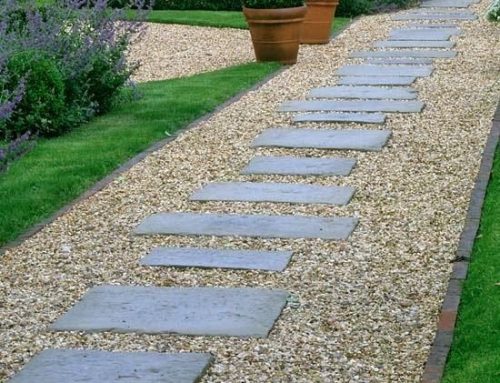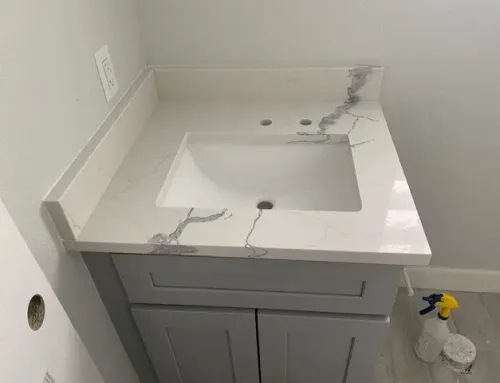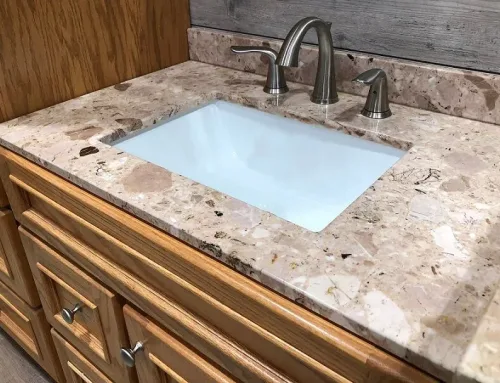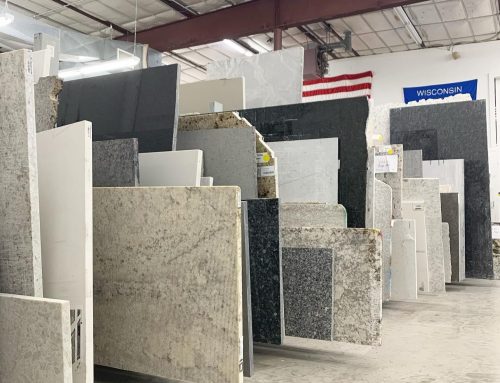What are most countertops made out of? When choosing a countertop, one of the biggest factors to consider is the material. Countertops come in a variety of styles, colors, and compositions, each with its own advantages. Whether you’re designing a kitchen, bathroom, or workspace, understanding the most common countertop materials will help you make the best choice.
1. Quartz (Engineered Stone)
Quartz countertops are one of the most popular choices today. Made from crushed quartz and resin, these engineered surfaces offer durability, stain resistance, and a wide range of colors and patterns. Also unlike natural stone, quartz does not need sealing, making it a low-maintenance option for busy homes.
Pros:
✔️ Non-porous and stain-resistant
✔️ Highly durable and scratch-resistant
✔️ Available in various colors and patterns
✔️ Low maintenance (no sealing required)
Cons:
❌ Can be pricey compared to some alternatives
❌ Not as heat-resistant as natural stone
2. Granite
Granite is a natural stone that remains a top choice for homeowners who love a unique and elegant look. Each slab of granite is one-of-a-kind, featuring natural veins, speckles, and color variations. It is extremely durable and heat-resistant, making it a great option for kitchens.
Pros:
✔️ Natural beauty with unique patterns
✔️ Heat-resistant and durable
✔️ Adds value to a home
Cons:
❌ Requires periodic sealing to prevent stains
❌ Can be expensive compared to other materials
3. Marble
Marble countertops are known for their timeless and luxurious appeal. The veining and natural patterns make each slab unique, making it a favorite among designers. However, marble is softer than granite and quartz, making it more prone to scratches and stains.
Pros:
✔️ Elegant and timeless aesthetic
✔️ Naturally cool surface, great for baking
✔️ Unique veining patterns
Cons:
❌ Porous and prone to staining
❌ Requires regular sealing
❌ Scratches more easily than granite or quartz
4. Quartzite
Quartzite is a natural stone that looks similar to marble but is much harder and more durable. It is heat-resistant and has a stunning appearance, making it a great alternative to those who love the look of marble but want something more resilient.
Pros:
✔️ More durable than marble
✔️ Heat and scratch-resistant
✔️ Natural stone with unique veining
Cons:
❌ Requires sealing to prevent stains
❌ Can be expensive
5. Solid Surface
Solid surface countertops, such as Corian, are made from a blend of acrylic and natural minerals. These countertops are seamless, meaning no visible joints, and they can be repaired if scratched.
Pros:
✔️ Seamless appearance
✔️ Easy to clean and maintain
✔️ Can be repaired if damaged
Cons:
❌ Not as heat-resistant as stone options
❌ Can scratch easily
6. Laminate
Laminate countertops, like Formica, are made from layers of plastic over a composite base. This budget-friendly option comes in various colors and patterns, including designs that mimic natural stone.
Pros:
✔️ Affordable and widely available
✔️ Easy to install
✔️ Many design options
Cons:
❌ Can be damaged by heat and scratches
❌ Less durable than stone or quartz
7. Concrete
Concrete countertops provide a modern, industrial look. They can be customized with different colors, finishes, and even embedded with decorative elements like glass or stones.
Pros:
✔️ Highly customizable
✔️ Unique, industrial aesthetic
✔️ Durable when properly sealed
Cons:
❌ Requires sealing to prevent stains
❌ Can crack over time
8. Soapstone
Soapstone is a natural stone with a soft, matte finish. Also it is non-porous and resistant to stains, making it a great choice for kitchens. Over time, soapstone develops a patina, giving it a distinct aged look.
Pros:
✔️ Non-porous and stain-resistant
✔️ Heat-resistant
✔️ Develops a beautiful patina over time
Cons:
❌ Softer than granite, making it prone to scratches
❌ Limited color options (mostly dark shades)
9. Porcelain
Porcelain countertops are a rising trend in modern kitchens. Made from high-fired ceramic, they are lightweight, durable, and available in stunning patterns that mimic marble, wood, or concrete.
Pros:
✔️ Extremely durable and heat-resistant
✔️ Available in large slabs for seamless designs
✔️ Stain and UV-resistant
Cons:
❌ Can chip or crack under heavy impact
❌ Higher installation costs
Final Thoughts
So what are most countertops made out of? Choosing the right countertop material depends on your lifestyle, budget, and aesthetic preferences. Moreover if you want something durable and low-maintenance, quartz is a great option. Also for a natural and elegant look, granite and marble offer timeless appeal. If you prefer something modern, concrete or porcelain might be the way to go.
So no matter what material you choose, investing in quality countertops can enhance the beauty and functionality of your space. Which type of countertop do you prefer? Let us know in the comments!





